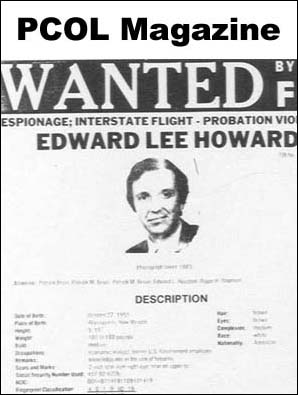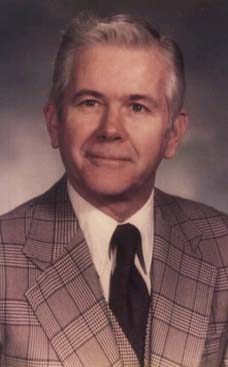October 10, 2005: Headlines: COS - Colombia: Intelligence Issues: Drug Use: Marijuana: The Olympian: Colombia RPCV Edward Lee Howard defected to the Soviet Union in 1985 after he was accused of espionage activities that spy hunters believe were driven by resentment over his forced resignation after he failed a polygraph test and disclosed his drug use in Colombia during 1975 when he was a Peace Corps volunteer
Peace Corps Online:
Peace Corps News:
Peace Corps Library:
Intelligence Issues:
October 10, 2005: Headlines: COS - Colombia: Intelligence Issues: Drug Use: Marijuana: The Olympian: Colombia RPCV Edward Lee Howard defected to the Soviet Union in 1985 after he was accused of espionage activities that spy hunters believe were driven by resentment over his forced resignation after he failed a polygraph test and disclosed his drug use in Colombia during 1975 when he was a Peace Corps volunteer
Colombia RPCV Edward Lee Howard defected to the Soviet Union in 1985 after he was accused of espionage activities that spy hunters believe were driven by resentment over his forced resignation after he failed a polygraph test and disclosed his drug use in Colombia during 1975 when he was a Peace Corps volunteer

An agency's attitude toward drug use has been blamed for unexpected consequences. The CIA forced one of its officers, Edward Lee Howard, to resign in May 1983 after he failed a polygraph test and disclosed his drug use in Colombia during 1975 when he was a Peace Corps volunteer. Howard defected to the Soviet Union in 1985 after he was accused of espionage activities that spy hunters believe were driven by resentment over his forced resignation.
Colombia RPCV Edward Lee Howard defected to the Soviet Union in 1985 after he was accused of espionage activities that spy hunters believe were driven by resentment over his forced resignation after he failed a polygraph test and disclosed his drug use in Colombia during 1975 when he was a Peace Corps volunteer
FBI may go easy on applicants' past pot smoking
BY TED BRIDIS
THE ASSOCIATED PRESS
WASHINGTON -- The FBI, famous for its straight-laced crime-fighting image, is considering whether to relax its hiring rules over how often applicants could have used marijuana or other illegal drugs earlier in life.
The Olympian - Click Here
Some senior FBI managers have been deeply frustrated that they could not hire applicants who acknowledged occasional marijuana use in college, but in some cases already perform top-secret work at other government agencies, such as the CIA or State Department.
FBI Director Robert Mueller will make the final decision. "We can't say when or if this is going to happen, but we are exploring the possibility," spokesman Stephen Kodak said
The change would ease limits about how often -- and how many years ago -- applicants for jobs such as intelligence analysts, linguists, computer specialists, accountants and others had used illegal drugs.
[Excerpt]
An agency's attitude toward drug use has been blamed for unexpected consequences. The CIA forced one of its officers, Edward Lee Howard, to resign in May 1983 after he failed a polygraph test and disclosed his drug use in Colombia during 1975 when he was a Peace Corps volunteer. Howard defected to the Soviet Union in 1985 after he was accused of espionage activities that spy hunters believe were driven by resentment over his forced resignation.
"I had been totally honest about each and every misdeed in my past, including my drug use in South America and my occasional abuse of alcohol," Howard wrote in his 1995 memoirs. He died in July 2002 at his home outside Moscow.
Some other federal agencies also have tough marijuana policies. The Drug Enforcement Administration will not hire applicants as agents who used illegal drugs, although it makes exceptions for admitting "limited youthful and experimental use of marijuana." The DEA, however, permits no prior use of harder drugs.
"Recreational marijuana use is a fact of life nowadays," said Mark Zaid, a Washington lawyer who has represented people rejected for FBI jobs over drugs. "It doesn't stop Supreme Court justices from getting on the bench and doesn't stop presidents from getting elected, so why should it stop someone from getting hired by the FBI?
When this story was posted in September 2005, this was on the front page of PCOL:





Peace Corps Online The Independent News Forum serving Returned Peace Corps Volunteers
 | Why blurring the lines puts PCVs in danger
When the National Call to Service legislation was amended to include Peace Corps in December of 2002, this country had not yet invaded Iraq and was not in prolonged military engagement in the Middle East, as it is now. Read the story of how one volunteer spent three years in captivity from 1976 to 1980 as the hostage of a insurrection group in Colombia in Joanne Marie Roll's op-ed on why this legislation may put soldier/PCVs in the same kind of danger. |
 | The Peace Corps Library
Peace Corps Online is proud to announce that the Peace Corps Library is now available online. With over 30,000 index entries in 500 categories, this is the largest collection of Peace Corps related stories in the world. From Acting to Zucchini, you can find hundreds of stories about what RPCVs with your same interests or from your Country of Service are doing today. If you have a web site, support the "Peace Corps Library" and link to it today. |
 | Friends of the Peace Corps 170,000 strong
170,000 is a very special number for the RPCV community - it's the number of Volunteers who have served in the Peace Corps since 1961. It's also a number that is very special to us because March is the first month since our founding in January, 2001 that our readership has exceeded 170,000. And while we know that not everyone who comes to this site is an RPCV, they are all "Friends of the Peace Corps." Thanks everybody for making PCOL your source of news for the Returned Volunteer community. |
Read the stories and leave your comments.

Some postings on Peace Corps Online are provided to the individual members of this group without permission of the copyright owner for the non-profit purposes of criticism, comment, education, scholarship, and research under the "Fair Use" provisions of U.S. Government copyright laws and they may not be distributed further without permission of the copyright owner. Peace Corps Online does not vouch for the accuracy of the content of the postings, which is the sole responsibility of the copyright holder.
Story Source: The Olympian
This story has been posted in the following forums: : Headlines; COS - Colombia; Intelligence Issues; Drug Use; Marijuana
PCOL22554
26













